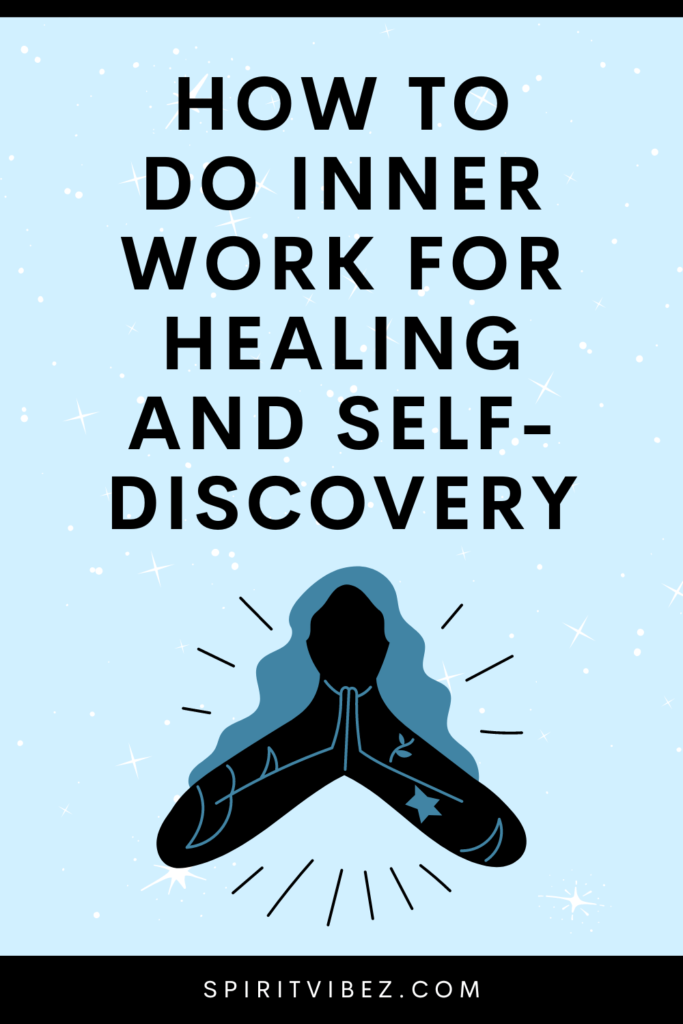Last Updated on February 8, 2024

Have you ever considered the immense power that lies within the depths of your own psyche, waiting to be harnessed for healing and personal growth?
In our hectic lives, we often find ourselves entangled in the external demands of the world, inadvertently neglecting the extraordinary potential that resides within us.
What if the key to true healing and profound transformation wasn’t found in outward achievements, but rather in the intentional exploration of our inner selves?
In this article, you’ll learn all about inner work—a journey that begins by asking ourselves the crucial question: How can we embark on the path of self-discovery and healing from within?
What is inner work?
Inner work is a profound and transformative process of self-exploration aimed at understanding, healing, and integrating the various aspects of our inner selves. It involves delving into the depths of our emotions, thoughts, beliefs, and past experiences with a conscious and introspective mindset.
This introspective journey encourages you to confront and process your fears, traumas, and unresolved issues, fostering personal growth and emotional resilience.
At its core, inner work is about cultivating self-awareness and building a deeper connection with your authentic self. It goes beyond surface-level self-improvement efforts, reaching into the layers of our psyche to uncover the root causes of patterns, behaviors, and reactions.
By engaging in inner work, you can gain valuable insights into your motivations, values, and life purpose, ultimately leading to a more fulfilling and meaningful existence.
The ultimate goal is to create a harmonious relationship between our inner world and the external reality we navigate daily, allowing us to approach life with greater clarity, compassion, and resilience.
Inner work, therefore, becomes a transformative journey of self-discovery and healing, empowering you to live authentically and thrive emotionally, mentally, and spiritually.
Signs you need inner work
Embarking on a journey of self-discovery often begins with recognizing the signs that indicate the need for inner work; here are key indicators to guide you on this transformative path.
1. Recurring patterns: If you find yourself stuck in repetitive and unproductive patterns in your relationships, career, or personal habits, it may indicate the need for inner work. Identifying and addressing the root causes can break the cycle.
2. Emotional reactivity: Experiencing intense emotional reactions that seem disproportionate to the situation might signal unresolved issues. Inner work helps in understanding and managing emotions more effectively.
3. Chronic stress or anxiety: Persistent feelings of stress or anxiety may be indicative of underlying issues. Inner work can unveil the sources of these emotions, offering avenues for coping and healing.
4. Difficulty in relationships: Struggling with relationships, whether it’s forming connections, maintaining them, or experiencing frequent conflicts, may suggest unresolved issues that require introspection and healing.
5. Lack of fulfillment: If you often feel a sense of emptiness or lack of fulfillment despite external achievements, it may be a sign that inner aspects of your life need attention and exploration.
6. Low self-esteem: Chronic feelings of inadequacy or a persistent negative self-image can be addressed through inner work, fostering self-compassion and a healthier sense of self-worth.
7. Avoidance of self-reflection: If the idea of introspection or confronting your own thoughts and emotions feels uncomfortable or is actively avoided, it may indicate a need for inner work to overcome barriers to self-awareness.
8. Unexplained physical symptoms: Unresolved emotional issues can manifest as physical symptoms. If you experience chronic pain, tension, or unexplained health concerns, it may be worth exploring the emotional aspects through inner work.
9. Feeling disconnected: A sense of disconnection from yourself or a feeling of being out of touch with your own desires, values, or purpose may be a signal that inner work is necessary to rediscover and realign with your authentic self.
10. Difficulty in decision-making: If decision-making feels overwhelming or consistently leads to regret, exploring your inner beliefs, fears, and desires can provide clarity and guide you toward choices aligned with your true self.
Recognizing these signs is the first step towards embarking on a journey of inner work, allowing for self-discovery, healing, and personal growth.
How to do inner work
Engaging in specific inner work exercises can provide structured approaches to self-discovery and healing. Here are some exercises you can incorporate into your inner work journey:
1. Mindfulness meditation
Set aside a specific time each day for mindfulness meditation.
Find a quiet space and sit comfortably. Close your eyes and focus your attention on your breath. Notice the sensation of each inhale and exhale. When your mind wanders, gently bring it back to your breath.
This practice cultivates a non-judgmental awareness of your thoughts and feelings, fostering a sense of presence and calm.
2. Self-reflective journaling
Dedicate regular time to journaling, allowing free expression of your thoughts and feelings.
Start with a prompt or write spontaneously. Explore your experiences, challenges, and joys. Reflect on patterns and changes over time.
Journaling provides a tangible outlet for self-expression and becomes a personal record of your inner journey.
Check out these journal prompts:
- New Year journal prompts
- Journal prompts for anxiety & overthinking
- Journal prompts to grow spiritually
- Journal prompts for gratitude
- Journal prompts for when you feel stuck in life
- Journal prompts to find your purpose
- Journal prompts to heal childhood trauma
3. Letter writing
Write a letter to your past, present, or future self. When addressing your past self, offer compassion and understanding for the challenges faced.
When writing to your present self, acknowledge accomplishments and current struggles. For your future self, express hopes and aspirations.
This exercise builds a connection between different phases of your life, fostering self-compassion and a sense of continuity.
4. Core belief exploration
Identify a core belief you hold about yourself or the world. For example, if you believe “I am not worthy of love,” explore the origin of this belief.
Was it shaped by childhood experiences or societal expectations?
Challenge its validity by seeking evidence to the contrary. Gradually replace limiting beliefs with positive affirmations that reflect your true worth and potential.
5. Emotional check-ins
Create a routine for emotional check-ins. List common emotions and rate their intensity on a scale from 1 to 10. Explore the triggers and context surrounding these emotions.
This practice enhances emotional intelligence, helping you understand and navigate your feelings more consciously. Over time, you may notice patterns and gain insight into emotional responses.
6. Guided visualization
Engage in guided visualizations to explore your inner landscape. Find a quiet space, close your eyes, and imagine a serene place or scenario. Pay attention to sensory details – sights, sounds, and smells.
This exercise can help uncover subconscious thoughts and desires, providing clarity on your inner aspirations and needs.
7. Shadow work
Shadow work involves exploring the unconscious or repressed aspects of yourself. Identify traits or emotions you tend to avoid or deny.
Integrating the shadow can lead to greater self-acceptance and a more holistic understanding of your identity.
Discover how to do shadow work step-by-step in THIS in-depth guide.
8. Values clarification
Reflect on your core values and priorities. Create a list of values that resonate with you, and rank them in order of importance.
Aligning your actions with these values can provide a sense of purpose and fulfillment. Regularly revisit and update this list as your values evolve.
9. Gratitude practice
Cultivate a daily gratitude practice. Acknowledge and write down things you are grateful for.
This exercise shifts focus towards positive aspects of life, fostering a mindset of abundance and appreciation. It can be a powerful tool for cultivating a positive outlook.
10. Body scan meditation
Practice a body scan meditation to connect with physical sensations and emotions.
Lie down or sit comfortably, and systematically bring attention to each part of your body. Notice any tension or sensations.
This exercise enhances the mind-body connection, promoting relaxation and self-awareness.
11. Inner child work
Engage in inner child healing by visualizing and connecting with your younger self. Consider their needs, fears, and desires.
Reparent yourself by offering love, understanding, and support to your inner child.
Find a complete guide to inner child healing, including inner child exercises HERE!
12. Life timeline exercise
Create a timeline of your life, marking significant events and milestones. Reflect on how these events have shaped you and consider the lessons learned.
This exercise provides a broader perspective on your personal journey.
13. Positive affirmations
Develop affirmations that challenge negative thoughts and reinforce positive self-talk. Repeat these affirmations regularly to cultivate a healthy self-image.
This practice can contribute to building self-confidence and a more optimistic mindset.
Check out these daily positive affirmations:
- 50 morning affirmations
- 30 affirmations for inner child healing
- 30 affirmations for depression
- 24 affirmations for manifestation
- 30 affirmations for emotional healing
- 30 affirmations for self-love & confidence
- 25 affirmations for anxiety
Remember, the key to successful inner work is consistency and a compassionate approach towards yourself. Explore these exercises at your own pace, adapting them to suit your preferences and needs on your journey of self-discovery and healing.
If you enjoyed this article on how to do inner work for healing & self-discovery, I would be grateful if you shared it on Twitter, Facebook, or Pinterest! Thank you❤️
📌 PIN THIS POST FOR LATER


Hello, my name is Sara and I am the founder of Spiritvibez, I’m here to guide you on your spiritual journey toward healing, growth, and self-discovery. I believe that true transformation occurs when the mind, body, and spirit are aligned and working in harmony. Through Spiritvibez, I hope to inspire and empower you to deepen your spiritual practice, embrace your authentic self, and begin living your best life.
